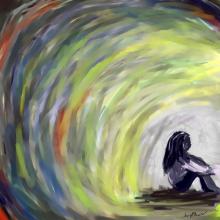Mental Illness
Each year 90,000 parents in the U.S. confront the profound suffering that follows the death of a child or adolescent.
Some of those rely on faith to help them through their grief. Others look to psychiatrists, who offer therapy or prescribe antidepressants to help ease their patients’ pain.
On Saturday, in a move that could add to the tension between religion and science, the American Psychiatric Association changed a controversial diagnosis regarding how grief relates to mental health.
The change “will affect every single person in the country, because at some point we’re all going to be bereaved,” said Joanne Cacciatore, founder of the Center for Loss and Trauma in Phoenix and a professor of social work at Arizona State University.
At issue are questions as fundamental as how long we grieve, what clinical label we assign to sadness, and when grief transforms into mental illness.
The modification also rekindles long-standing debates about whether spirituality or medicine offers the best pathway out of bereavement.
FOR SERIOUS AND chronic mental illness, there is no cure—short of a miracle. There is no “all better.” Even when well managed, such illness is a lifelong reality, and relapses can happen without warning. Even for episodic illness, the road to health can be long and mountainous. Walking alongside someone with mental illness may mean a lifelong hike over peaks and valleys, learning to grow in faith and in relationship with Jesus through an illness that clouds the view. That walk might cause mistrust of reality and of a person’s own thoughts. It might require extra patience for processing truth. It might repeatedly tax the resources of the church and its fellowship. And churches, like other organizations, grow tired of such taxation. Culturally, we expect people who fall down to pull themselves back up and put their hands to the plow. Sure, everyone stumbles occasionally. And we’re willing to give help in times of crisis. But when that time of crisis doesn’t seem to end, we start to wonder why we’re still helping. Why we’re not seeing progress. Why we’re not moving on.
The father of a son with bipolar disorder spoke passionately from his experience:
Attitudes have to change. This doesn’t go away. … that’s the issue that anyone with mental illness or anyone who is going to minster to mental illness is going to eventually wade into. Wait a minute. We helped you with this a year ago, two years ago. The problem is like telling a diabetic, “We helped you with your blood glucose a year ago.” Yeah, but guess what. They’ve got to do this every minute of the day until they die. So that is a daunting task … it has to fall to the whole body of Christ, because it’s only the body that can handle something like that for a lifetime.
The Rev. Frank Page, former president of the Southern Baptist Convention, was getting ready to work in the yard in the fall of 2009 when the phone rang. His daughter was on the line.
Daddy, I love you, she said. Tell Mama and the girls I love them, too.
Then she was gone.
Melissa Page Strange, 32, took her own life just after hanging up the phone with her dad.
“I do not want you to imagine what that is like,” he said.
For years, Page did not share the painful details of Melissa’s death, fearing that some Christians might speak ill of her if they knew. Mental illness and suicide were taboo topics for many churches, seen as a kind of spiritual failure.
But that may be starting to change.
This week on the Homebrewed CultureCast, we welcomed Stephen Simpson, one of the heads of Psychology at Fuller Theological Seminary, to the show to discuss the intersection of faith and psychology. Specifically, we wanted to try and figure out with him where the thin line between religious fanaticism and pathological mental illness was. Hey, there it is!!!
For years, I had fought against the stigmas that dehumanize people with mental illness. Now here I was on the inside.
THE LIFE OF A SCHIZOPHRENIC TWIN BROTHER informs my mind and heart as I ponder why it is that the mentally ill pile up on our streets and the streets of the world. Richard was a freshman at St. John's College in Annapolis, Maryland, beginning his study of the 100 great books, when he was drafted into the Army and sent to the battlefields of World War II. I was never to see him well again.
I have lived with madness.
I have cowered in other rooms while this brother in uncontainable agony of spirit tore pictures from the walls and flung chairs across the room.
I have stood at the foot of a retaining wall while he walked on a narrow ledge 50 feet above, weighing in his mind whether to jump or not to jump.
I have hovered out of sight while the police I had summoned came to take away and "put away" the distraught human being who was the dearest friend I would ever have.
From this brother of mine I have learned what it is to wait through countless days and months and years for the return of someone held dear—so slow was I to know that he would never come back again.
This brother has taught me everything profound that I know about prayer. He taught me liberation theology before there were words for it, making it a part of my blood and heartbeat. From him I know that Christianity is not Christianity unless it has a large and radical incarnational dimension.




